English Language Teaching Practices (ELT)
AIU offers a unique linguistic and cultural environment for its students. English is routinely heard, spoken, and used in and out of the classroom. Numerous opportunities are available for practicing English in formal and informal settings. A robust intensive English language program, English for Academic Purposes (EAP), creates the perfect setting for observing experienced teachers doing what they do best. The Language Development and Intercultural Studies Center (LDIC) offers ideal opportunities for self-directed learning, group study, and familiarity with excellent teaching materials and resources. AIU, in other words, is the perfect campus for improving one’s own communicative competence in English while learning how to be an expert at teaching others. The ELT program offers a solid foundational curriculum in language teaching theory and pedagogy while promoting opportunities to become a competent and reflective life-long learner of language and culture – in this case, English.
Expected Student Outcomes
- Knowledge of English as a language
- Understanding of the role of English in a globalized world
- Comprehension and application of fundamental TESOL theories and methods
- Familiarity with methods of inquiry in language education
- Processing and critical analysis of information
- Competence in language classroom communication issues
- Ability to express oneself professionally in speaking and writing
- Self-reflection as an educator
Feature of ELT Program
Feature 1: Flexible Scheduling
While the English Language Teaching Practices program is generally completed over the course of two years, it can also be completed over three to four years by taking weekend classes, ideal for those currently working.
Feature 2: Teaching Certificate
ELT students have the privilege to upgrade their Type 1 Teaching Certificate to an Advanced Teaching Certificate by completing the necessary courses. Students without a Teaching Certificate have the option to join the Teacher’s License Program to earn a Type 1 Teaching Certificate for Upper Secondary School.
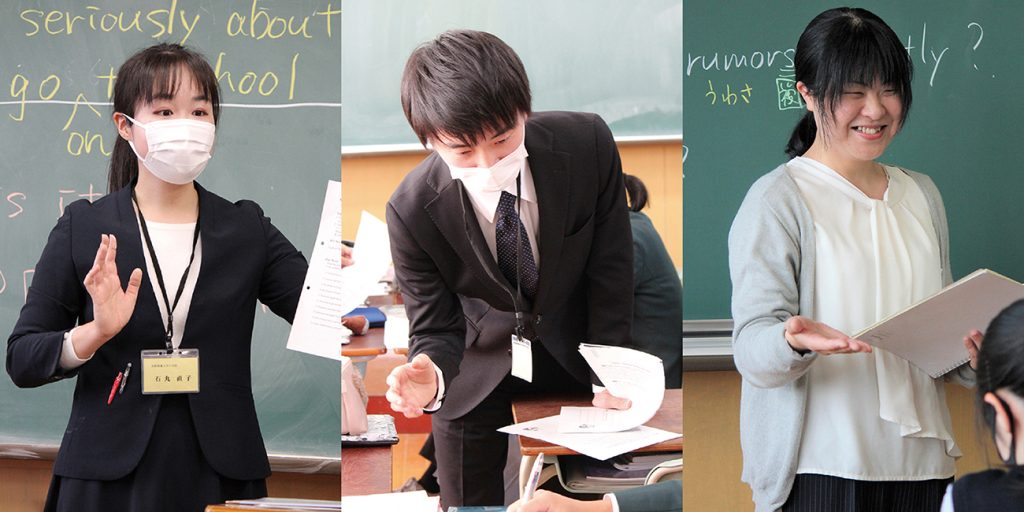
English Village Program for Young Students
As one component of the Top Global University Project (MEXT), ELT students have been designing and offering the English Village Program on a regular basis, which is a three-day English learning opportunity for young students from across the country. ELT students enjoy the privilege of trying out their own teaching techniques and materials with groups of authentic students.
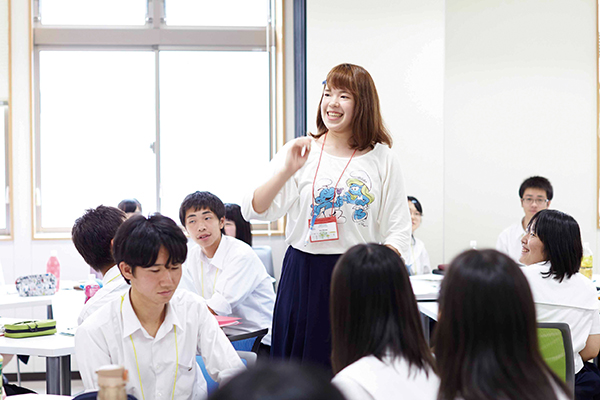
Scholarly Activities
ELT students are encouraged to conduct academic research. Students acquire necessary skills for research and academic writing in the course work to present at international conferences.
JALT2022 in Fukuoka, Japan
- Fostering Autonomous English Learning Through Speaking Activities in SHS
- Promoting Interactive Classrooms in JHS English Lessons
- Facilitating Interactions and Reducing Language Anxiety among Japanese HS Students
- Focus on Listening and Facilitating Student Self-Assessment Using Dictogloss
- Do People Have Same Images When Hearing Same Words?
- Student-Centered Knowledge Building in Zoom Class
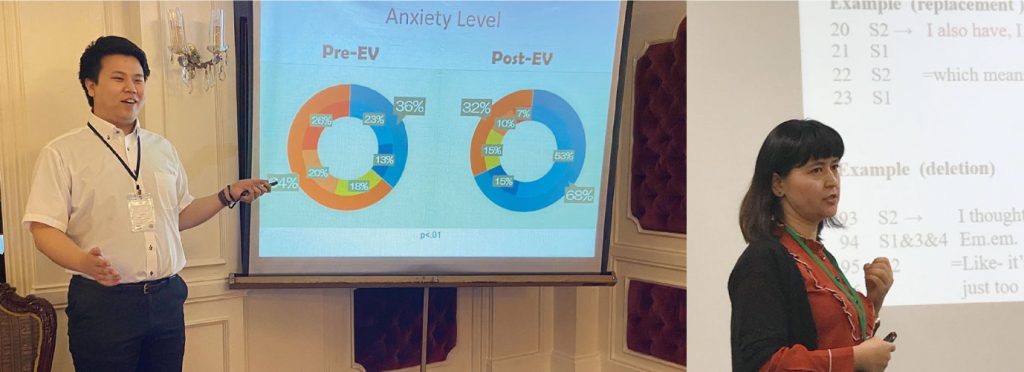
Message from Program Head
When you look at English as an international language (EIL), you may soon realize that your current/future students will be more likely to communicate in English with speakers of English as a second/foreign language (ESL/EFL) rather than with native speakers of the language. This implies that English teaching should focus more on training students to be speakers of EIL, which can be Japanese-like English but should be acceptable enough.
Fluency will be the key factor in the new phase of English education in Japan. Accuracy development should occur concurrently with fluency development. Therefore, you have to be ready to get rid of your baseless belief that students need to learn a large amount of vocabulary first. In addition, obtaining good knowledge of grammar structures before speaking or writing in English is an outdated notion. For the students’ fluency development, opportunities for meaning-focused learning are indispensable, which, in fact, have been missing in many English classrooms in Japan.
To know is one thing, while it is quite another to do. As this proverb suggests, you need to be familiar with a variety of EFL/ESL theories. When our ELT program says you are familiar with a theory or teaching technique, you are supposed to not only know it, but also to be able to practice it in your classroom. This is what makes our ELT program different.
Hiroki UCHIDA
Dean and Director of the Graduate School
Head of English Language Teaching
Practices Professor
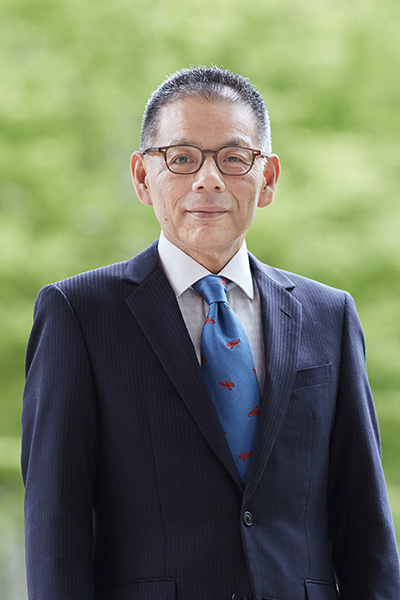
Message from Alumni
Just as there is a learning plateau for students, there is a certain plateau for teachers in their own teaching practices. After several years of experience, teachers gradually settle into their fixed teaching styles and tend to remain within their own comfort zone. However, the demands on education are changing at a very rapid pace. Now teachers must not only impart knowledge to students but also foster skills such as critical thinking, creativity, collaboration, and communication, oftentimes expressed as “4Cs,” in order for students to survive in the 21st century (Pinter, 2017).
Many teachers, like I once was, are stuck in the comfort zone of teaching knowledge, but the theoretical acquisition and practice opportunities in the ELT program provide a methodology for increasing student engagement in the classroom while fostering skills such as the 4Cs above. All of the courses offered by this program will provide opportunities for teaching demos and presentations, so you can immediately apply the methodologies you have learned from papers and lectures. There are also opportunities for practicums outside of AIU to teach in actual JHS/SHS contexts and to present at some academic conferences on what you have learned and found throughout your course work, where you can exchange ideas with other language educators in Japan and abroad.
The ELT program emphasizes practices, and allows you to learn useful pedagogical theories in practical ways. I resumed my career as an English teacher at a prefectural high school in Akita after two years of study in this program, and I am surprised to find myself with a completely different teaching style than I used to be in. I strongly believe that two years at AIU are irreplaceable because they have refreshed my sense of enjoyment in teaching. If you are an in-service teacher seeking ways to break out of your comfort zone, you should definitely apply for this program.
Shuntaro MIURA (Nationality: Japan)
| 2005 Mar. | Graduated from Osaka University |
| 2021 Apr. | Enrolled in Graduate School of Global Communication and Language at AIU |
| 2023 Mar. | Completed Master of English Language Teaching (Professional) |
| 2023 Apr. | Currently teaching at Akita Prefectural Kakunodate High School |
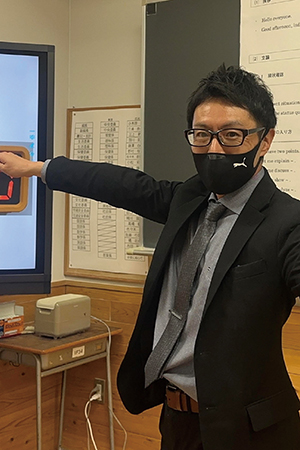
The two years I studied at AIU were very intense, and it was a great moment in my life. Before entering AIU, I worked at a public junior high school in Nara Prefecture for three years. However, while teaching English to junior high school students, I spent my days wondering, “Can I improve students’ English skills with this teaching method?” “How can I teach English effectively?” and “What is ‘teaching’ anyway?” Therefore, when I got the opportunity to study at AIU, I still remember how happy and enthusiastic I was to be able to improve my teaching skill.
The biggest experience here was that I was able to break away from stereotypes that I had never doubted. When I was working at the junior high school, I had stereotypes of teaching that “I should follow what other teachers do” or “English lessons should be stick to the textbook.” Such beliefs bothered me a lot. At first, it was not easy to get rid of those myths. However, by learning theories and practicing them in demo lessons and practicum, I could finally get out of my traditional teaching methods. Every time I would stick to an outdated approach, the professors and colleagues pointed it out and made me realize that I might be on the wrong track. It was always a great moment for me to get feedback from professors and see other classmates’ demo lessons.
I am currently teaching at Nara Prefectural Kokusai Junior/Senior High School. The Junior High School was just established in April, 2023. Many students are excited to study at the new school. I think this is a good place to practice the knowledge and skills I have acquired at AIU because I can help students think about various aspects of the world through learning English. I want students to learn English in a more enjoyable way, so I need to be creative when I plan my lessons. It also allows me to enjoy teaching in English. Sometimes I got some reflection comments from students that my lesson was fun and they learned a lot from it, which motivates me to do more to help my students. Each day is challenging for me, but it also is fun and fulfilling. I will keep doing my best to apply what I learned at AIU to my English lessons.
Azusa MATSUMOTO (Nationality: Japan)
| 2018 Mar. | Graduated from Kobe City University of Foreign Studies |
| 2021 Apr. | Enrolled in Graduate School of Global Communication and Language |
| 2023 Mar. | Completed Master of English Language Teaching (Professional) |
| 2023 Apr. | Currently teaching at Nara Prefectural Kokusai High School |
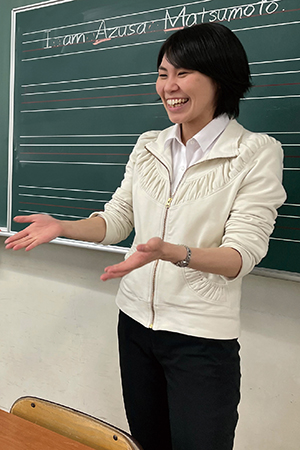
Students’ Voice
What I have learned the most in ELT is that speaking English as a teacher in a classroom requires much more than just being fluent. Your instruction has to be natural, yet it is no use if students do not understand what you say. It takes an incredible amount of linguistic knowledge, communication skills, and first-hand experience to modify your speech to achieve these goals. ELT provides all you need to improve your “teacher talk” skills.
Rintaro IKEGAMI
(Nationality: Japan / Undergraduate: Osaka Kyoiku University)
We critically discuss different theories and methodologies in ELT and demonstrate the activities to analyze their effectiveness. In order to implement theories and methodologies in practice, it is more important that teachers have the ability to solve various problems, combine the theories, and collaborate with one another. ELT helped me gain confidence by improving my problem-solving skills.
Sarmin Farhana
(Nationality: Bangladesh / Undergraduate: National University of Bangladesh)
ELT helped me get out of my comfort zone. At the beginning of the program, I realized how little I knew about what it is to teach English in a communicative way. Fortunately, in ELT, there are ample opportunities to do demo teaching and discuss how to apply theories to practice. In addition, my classmates’ ideas broaden my perspective. In this community, I enjoy challenging myself. Now, I can clearly picture myself being an English teacher.
Rio TSURUTA
(Nationality: Japan / Undergraduate: Kyoto Sangyo University)
Aspiring to become an English teacher who can help students realize their full potential in their ability to communicate, I chose ELT. It is equipped with the necessary theoretical knowledge and indispensable practical teaching skills. ELT has rewarded me with more than I expected. Action research training, practicums at higher education institutions and high schools, and the communication-oriented English learning program called “English Village” have provided me with invaluable experience, which I can utilize to empower students’ communication skills in my future professional career.
Ying ZHOU
(Nationality: China / Undergraduate: Sichuan University)
Example Career after Graduation
Full-time English Teaching Positions at Junior/Senior High School
- Miyagi Prefecture Hakuo High School
- Miyagi Prefecture Sendai Daisan High School
- Osaka Prefectural Makino High School
- Ishinomaki Municipal Kitakami Junior High School
- Akita Prefectural Noshiro High School
- Shizuoka Prefectural Hamamatsu Konan High School
- Nagasaki Prefectural Nagasaki Hokuyodai High School
- Hokkaido Kitami Hokuto High School
Full-time English Teaching Positions at Higher Education Level
- National Institute of Technology, Niihama College
- National Institute of Technology, Akita College
- Akita International University
- University of Fukui
Reappointment as an English Teacher in Akita and Nara Prefecture
